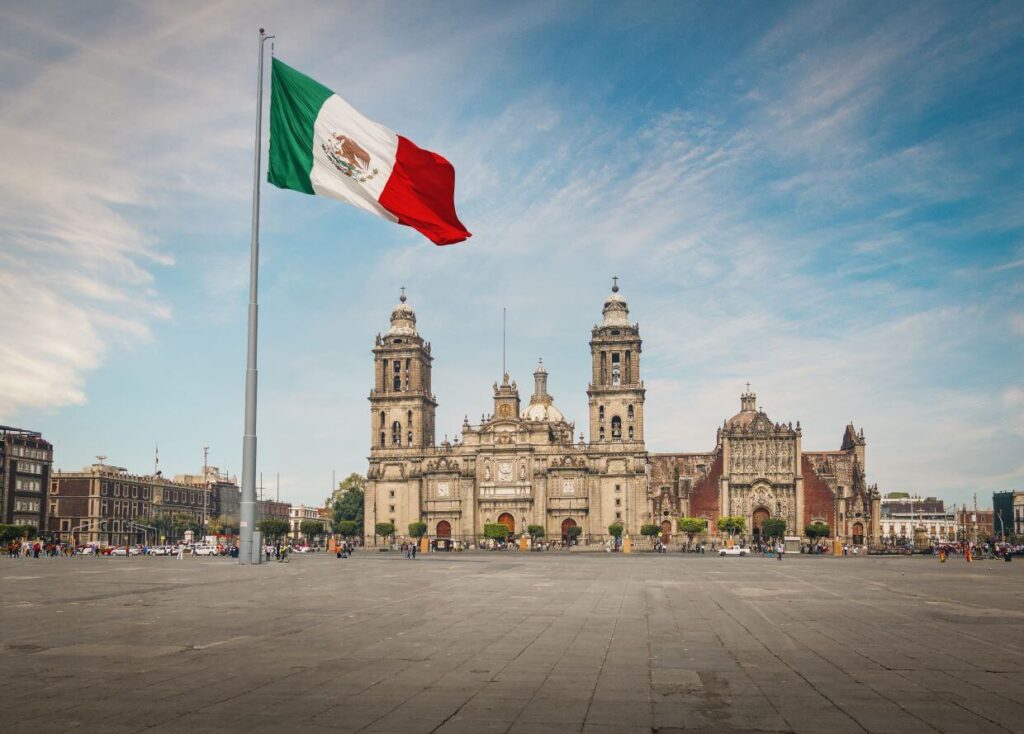When Emirates revealed intentions to launch flights from Dubai to Mexico City via Barcelona, Aeroméxico vowed to oppose the move by all means necessary. The flag carrier has since taken legal action pleading the Mexican government to reverse a decision that allows the Gulf airline to exercise fifth freedom rights on the route. To get ahead of the potential market entrant, Aeroméxico has also launched its own service between Mexico City and Barcelona. So where did it all begin and where is the dispute headed?
A year after the news about the airline’s plans first emerged, Emirates confirmed on July 16, 2019, that it is looking to launch a new daily service from Dubai International Airport (DXB) to Mexico City (MEX) via Barcelona El Prat (BCN) in Spain. The new route would be operated with a Boeing 777-200LR in a two-class configuration with a total of 302 seats, including 38 in the business cabin. The new flight would also be able to carry up to 14 tons of cargo. The new service is set to commence on December 9, 2019.
Why Barcelona? Direct flights from Dubai are not viable due to the high altitude of Mexico City (7,350 feet or 2,240 meters), which results in reduced takeoff performance and restricts the payload of an aircraft. Emirates needed to add a stopover between Dubai and Mexico’s capital city by way of a fifth freedom flight, which would allow the airline to travel between the two points via a third country.
As Sir Tim Clark, President of Emirates, stated in an official press release announcing the route: “Due to the high altitude of Mexico City airport, it is not possible to operate a non-stop flight from Dubai, and Barcelona was a natural choice for a stopover”. A stopover also has its benefits – it means the Gulf carrier can drop off and pick up passengers in Barcelona, allowing them the choice to fly only on the Barcelona-Mexico City leg of the journey and vice versa, or fly the entire route.
The route was approved by the relevant Spanish and Mexican authorities. A bilateral agreement, signed in 2015 between the governments of the United Arab Emirates and Mexico, paved the way to fifth freedom rights being granted to the Dubai-based carrier for the Barcelona – Mexico City flights, as A21.mx points out. In March 2018, Emirates also secured fifth freedom rights on the route by Spanish authorities, as newspaper La Vanguardia reported.
“We would like to thank the authorities and our partners in both Spain and Mexico for their support of the new route and look forward to providing our unique product and award-winning service to travelers,” Clark said in the announcement of the route launch. At the time, Mexican officials offered their backing for the new route. According to Rodrigo Vasquez C, Director General of the Mexican Civil Aviation Authority (DGCA), the arrival of Emirates into the market would “bring a significant contribution to our international connectivity“.
Aeroméxico tries to beat Emirates to the punch
In order to get ahead of incoming rival Emirates, Aeroméxico launched, on June 15, 2019, its own three times per week service between Mexico City and Barcelona utilizing its Boeing 787-8 and 787-9 Dreamliners. The national airline had already been operating direct flights to Madrid, Spain’s capital city.
“The opening of this new route allows us to consolidate our presence in Europe, a market with which we set a trend over 60 years ago, becoming the first and still the only operator from Mexico in Europe,” Paul Verhagen, Senior Vice President of International Sales and Global Channels Strategy, said in an official statement marking the occasion.
Not only did the carrier launch the route, but it has also opted to increase connectivity from three to five weekly flights, starting December 10, 2019, only a day after Emirates’ new flights are scheduled to start. Aeroméxico also revealed it will launch daily services from March 2020. According to the airline, “this decision is designed to meet the demand of its Catalan customers, which has been very positive” since the start of flights to Mexico City, according to a statement on July 19, 2019.
The news came right before Aeroméxico published, on July 16, 2019, its second-quarter results, revealing that the grounding of the Boeing 737 MAX has resulted in the carrier posting a negative 2.2% capacity growth in 2Q of 2019. The Mexican airline has taken delivery of six 737 MAX 8 jets, according to Boeing’s order and delivery summary (through July 2019).
During an earnings conference call to analysts on July 17, 2019, Aeroméxico’s CEO Andrés Conesa admitted that the Boeing 737 MAX situation has also forced the airline to cancel five routes. And these are not the only routes being cut by the airline. One in particular, the three times weekly Mexico City – Tijuana – Shanghai service that is to be suspended from December 15, 2019, according to Routes Online data, has something to do with Emirates.
Continues in Part II

